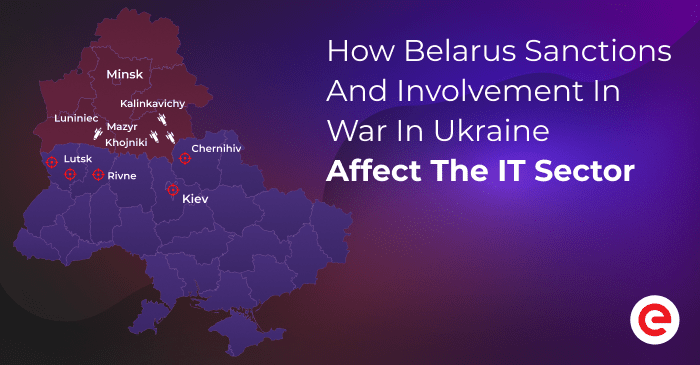
April 4, 2022
It’s nearly impossible to turn a blind eye to the situation in Ukraine. People all around the world keep abreast of the news. The war has already affected everyone, including military forces and the civilian population. Of course, we cannot compare the negative impact on the Ukrainian people and the people of the aggressor countries. Still, the sanctions have noticeably hit the economy of Belarus and Russia.
We wouldn’t avoid mentioning the crush of infrastructure in some regions of Ukraine, broken hospitals and educational institutions. The damage is invaluable, and it is clear to everyone. But the conflict has also negatively impacted the business sphere, affecting almost all people who had established working routines before the war.
List Of The Content
- How Belarusian and Russian involvement in the war affects the software outsourcing
- Belarusian involvement in the war in Ukraine
- The general political situation in Belarus
- Sanctions against Belarus and their impact on the IT sector
- The ethical side of working with Belarus
- Conclusion
THE IMPACT OF BELARUSIAN AND RUSSIAN INVOLVEMENT IN THE WAR ON THE IT OUTSOURCING
In the current situation, the IT services sector is in great turbulence since 3 of the top 10 countries considered outsourcing destinations are dragged into a war with each other way or another. Ukrainian IT sector employs around 200 000 IT specialists, Belarus has 85 000 IT specialists, and approximately 30% of Russian 700 000 IT workers are involved in the outsourcing and integration industry. All those people can’t effectively collaborate with each other due to the newborn cultural gap. Moreover, now Belarus and Russian developers can’t access Upwork, register new AWS accounts, use Docker, IDEs by JetBrains, use Jira, Slack, etc. while the company’s management can’t effectively accept payment from foreign clients. It is also worth mentioning the moral aspect of continuing collaboration with remote staff in Belarus and Russia. Employees from western offices feel stressed and anxious because of collaboration with the countries that have shown open military aggression against Ukraine.
Most operations in IT are performed online with the help of specific software, online banking, etc. Due to the sanctions, it all becomes impossible now. In the IT sphere, the outsourcing model is pretty widespread. So not only Belarus and Russia suffer from the sanctions, but also their clients from all world regions. While people from the aggressor countries are left without jobs, their clients from other parts of the world suffer from the lost projects. Consequently, companies who’ve been working with Russian or Belorusian contractors are forced to find replacements as soon as possible or stop the projects, which negatively impacts the economic conditions.
In the current situation, it is complicated to maintain the usual workflow, and each company in Ukraine and other countries deals with it in its own way. Today, we’re going to discuss how the sanctions in Belarus and their involvement in war affect the IT sector and how to deal with these challenging times.
BELARUSIAN INVOLVEMENT IN THE WAR IN UKRAINE
Some people prefer to refrain from constant news reading. It indeed has a positive impact on mental health. However, to better understand the effect of Belarus’ actions on all spheres of life, let’s describe its involvement in the war in Ukraine.
Let’s start with the 24th of February and see how Belorus entered the war in Ukraine along with Russia. On the first day of the war, missile attacks have been conducted on those regions of Ukraine that are located close to Belarus. Moreover, according to Atlantic Council, tanks were moving onto the Ukrainian territory from Belarus, and there’s more. Missiles were launched from the Mogilev (Belarus) region. Later, we observed Russian flamethrowers and infantry fighting vehicles crossing the Belarusian – Ukrainian border.
We can assume that Belarus was the first country to enter the war, even before Russia. Of course, the Belarusian government denies their country’s involvement in military actions. In fact, they didn’t use their own equipment and allowed Russia to use their country as the launching pad for their rocket launchers. But can we say that this is a “non-involvement”?
The situation with Belarus and Russia wasn’t clear from the very beginning. The things that we’ve seen significantly differed from the government’s claims. However, now everyone knows that everything said was a lie. First off, Russian troops were sent to the Belarus-Ukraine border for military training. Russia promised to leave that area soon, but in a couple of days, the Ministry of Defense claimed that the troops would stay in Belarus for an unknown period.
Later, things got even more tangled. Lukashenko said that they are ready to reconsider the non-nuclear status of the country and allow Russia to relocate their nuclear weapons on their territory. The constitution strictly prohibited it. However, even this couldn’t stop the leader of Belarus. So, a referendum was held on the 27th of February. As a result, Belarus revoked its non-nuclear status.
Since the first days of the war, Ukraine experienced severe fighter jet attacks from different directions, mainly from Belarusian air space. What’s curious, Belarus tried to support its claims about non-participation in war by launching a helicopter without identification marks. Reform.by said that “an unmarked military helicopter attacked the bridge in front of the Slavutych checkpoint on the Belarusian-Ukrainian border.” So, we can see that despite the numerous claims about Belarus’ non-involvement, it is used by Russia as a bridgehead for attacks in Ukraine. Moreover, Belarus decided to supply its military troops as additional assets for Russia.
As proof of Belarusian involvement in the war, which the country so persistently denies, is the fact that Belarusian hospitals are filled with wounded Russian soldiers. The government isn’t transparent about this, so there are no specific numbers of people who stay there.
We can only hope that such indecent actions of Belarus will end at some point. Still, performed actions will definitely leave their mark on Belarusian history and global society’s attitude to the country.
THE GENERAL POLITICAL SITUATION IN BELARUS
Unfortunately, Belarusian people don’t have the opportunity to choose their government and freely express their opinions. Despite Belarus de-jure being a democratic country, people there have been experiencing dictatorship for the past 30 years, and nobody can’t predict how much longer it will last.
The chances that Belarus will start following Western standards anytime soon are pretty close to zero. Though you might have heard Lukashenko saying that Belarus supports the European Union and the way of living of the Western world in general, his actions claim the opposite. For example, during the meeting of Guido Westerwelle and Alexandr Lukashenko, the minister of Germany, who’s openly gay, claimed that Lukashenko would be the last dictator in Europe. In response to this, Lukashenko contended that “It’s better to be a dictator than gay.” There are many more judgemental and aggressive statements concerning minorities, such as migrants, LGBTQ, and others.
What’s more interesting is that he publicly claims that the West is an enemy to Belarus and other countries from time to time. Lukashenko keeps talking about the conspiracy of the West, about their secret plans to destroy the world, etc. Consequently, he does everything possible to stay away from Western standards. That’s why Lukashenko maintains the dictatorship in Belarus and promotes the regime inherent in the USSR.
At this point, we should refer to the Belarus presidential election in 2020. Nobody could imagine such an amount of hostility that the Belarusian people faced during numerous protests after the elections.
Electoral fraud was so evident that thousands of people left their homes to object to protest against authoritarianism and political repression. People arranged demonstrations even in the smallest towns of Belarus. However, they achieved only violent persecutions by the authorities, arrests of 30 thousand citizens, and the exile of many politicians, including Sviatlana Tsikhanouskaya – Lukashenko’s opponent in the elections and the opposition leader.
As we can see, even people’s deaths mean nothing to their leader, so there’s no point in hoping that the anti-war protests in Belarus will change something. We can only expect that sanctions will change the situation in favor of Ukraine. Regarding sanctions, let’s discuss what companies left the Belarusian market and how it affects the IT sector.
SANCTIONS AGAINST BELARUS AND THEIR IMPACT ON THE IT SECTOR
Political And Financial Sanctions
First off, it’s necessary to mention the sanctions that affect the financial sphere. In terms of outsourcing, it’s highly essential that the banking systems and money transfers are available and work as usual. However, now it is problematic to perform any kind of financial operations with Belarus according to numerous sanctions. Let’s see how the work of the financial sphere has changed in terms of the Belarusian involvement in the war.
Probably the most significant restriction is the SWIFT ban. Three Belarusian banks were banned from SWIFT. They are:
- Belagroprombank
- Bank Dabrabyt
- Development Bank of the Republic of Belarus
Needless to say that all transactions overseas from these banks are unavailable now due to the absence of accurate and secure transfer instructions that SWIFT provides.
Another critical thing is that the transactions from the legal entities and natural persons of the European Union to Belarus in euros are strictly prohibited. The problem is that any country that provides outsourcing services usually has clients from the EU. Of course, when clients need to make a transaction to Belarus, they can exchange money for any other currency apart from euros, but they would lose a significant percentage of money on the rate differences. As a result, we have clients and software companies from Belarus that cannot communicate according to the private companies’ sanctions that we’ll discuss later and cannot pay for the provided services. That’s why financial sanctions have a vital effect on the IT sector.
As for the private financial companies, they have left the Belarusian market as well. They are WesternUnion, American Express, Visa, Mastercard, Payoneer, Revolut, and Paypal. So, online transfers aren’t so easy anymore. Moreover, even cryptocurrency isn’t an option because tokens like QMALL and CEX.io are no longer available in Belarus.
Private Companies Response
The most influential countries and unions condemn the actions of Belarus and keep providing sanctions for the country. They have an immeasurable effect on all business spheres and people’s lives. A significant percentage of sanctions concerns precisely the IT-sphere. Numerous famous software and hardware providers have left the Belarusian market. Let’s enlist the structures that decided to stop their services on the territory of Belarus.
First off, many private companies have left the market of Belarus or are going to do so. Among them, there are tech giants that provide tools for various spheres of programming. Let’s name the most significant ones and see what effect their ban will have on the IT sector:
- Collaboration tools: MS Teams, Slack
- Project Management: Jira, Confluence
- Coding tools: Docker, MongoDB, GitLab, JetBrains, CircleCI
- Cloud provides: Azure, Oracle, AWS
- Freelance and work search platforms: Upwork, Djinni, Jooble
It’s difficult to say which tool on the list impacts the IT sector most because all of them are highly important. Slack, for example, is one of the most used collaboration tools between teams. Moreover, it doesn’t just cease to update software but erases all existing users with the Russian and Belarusian locations.
As for the coding, we should say that JetBrains is the most popular tools provider for programmers and project managers. JetBrains developed the most loved IDEs. They include PyCharm, Intellij IDEA, CLion, Webstorm, etc. Of course, there are many replacements, but it may be challenging to find something of the same quality.
The importance of cloud providers’ ban on Belarus is quite apparent, but let’s see what will happen to the existing web applications hosted by Azure or AWS. Most enterprise apps use Azure or AWS as cloud providers. Their ban on Belarus means that companies will need to transfer numerous complex applications to other servers, which is so complicated that the software usually needs to be majorly reconstructed after such an operation. Also, AWS no longer has offices in Russia and Belarus and doesn’t accept new clients from these countries. So, we can see a total ban which leads to the inevitable changes in the usual workflow of IT companies.
Impossible collaboration between clients and software providers due to the private companies’ sanctions
MS Teams, Slack, Jira, Azure, and AWS have left the Belarusian market, and the workers from the different countries cannot communicate with each other in a secure and easy way. Moreover, the access to the shared environments that Azure and AWS provide, is restricted.
Last but not least, such a popular freelance platform as Upwork blocked the existing Belarusian and Russian users and restricted the access of the new users to these platforms. It is a massive problem because international clients find software providers precisely via freelance platforms in most cases. Now, it’s become impossible for all sides to collaborate. Many other messengers allow clients to continue working with their existing partners, but the messengers don’t provide any guarantees and data protection as Upwork.
THE ETHICAL SIDE OF WORKING WITH BELARUS
Most Western companies refuse to work with the aggressor countries despite having many signed contracts. However, there’s the other side of a coin – some companies are willing to bypass the sanctions. They don’t want to break the existing contracts with Belarus because they’ve put too much effort into them. Such companies find loopholes to maintain communication as usual regardless of the sanctions. However, let’s discuss the ethical side of working with Belarus in terms of the current situation in Ukraine.
So, why is it so essential to cease collaboration with Belarusian companies? The answer is taxes. The share of the IT sector in GDP was 4% in 2020. Whereas, the expenditure in the consolidated budget on the national defense constituted 3.36% in 2021. That’s why we can see that the taxes from the IT sector theoretically can cover all expenses on the national defense. So that, when the foreign clients pay the software companies in Belarus, they indirectly supply the Belarusian military forces.
Suppose you don’t want to help the aggressor country with financial resources. In that case, you should know about one of the loopholes Belarus and Russia have found to bypass the unwillingness of the Western companies to work with them.
Usually, when someone wants to find a service provider, they use freelance services or websites with ratings of IT companies. We’ve already discussed the situation with the freelance platforms, so let’s look at the issue with the review services. One of the most famous platforms is Clutch. It has banned most Belarusian companies. However, they tried to cheat the listing resources. After the 24th of February, they all started massively changing their location. In May 2021, Clutch included about 180 Belarusian companies that provide web development services. Now, in March 2022, one can’t find a single Belarusian company on this listing. If you check the name of any company that was on the list a couple of months ago, you’ll most likely see that it’s located somewhere in another country.
For example, let’s check two profiles that can be seen on the Wayback Machine snapshot:
- Rubyroid Labs. Belarus location removed from website, Linkedin shows 39 of 52 employees located in Belarus. The new location on Clutch – Poland.
- iTechArt Group. LinkedIn shows 2200 of 2700 employees located in Belarus. The new location on Clutch – USA.
So, if you’re serious about avoiding collaboration with Belarusians, it may be helpful to use a Wayback machine service to detect whether the company’s actual location isn’t Belarus. The changed location is only a reputation move, and those who work in a firm still pay taxes. So, it’s crucial to understand who you’re going to collaborate with.
TOP 3 ALTERNATIVES TO BELARUSIAN IT COMPANIES
Considering that numerous companies can’t continue collaborating with the Belarusian service providers, it’s essential to find a replacement. Fortunately, Eastern Europe has many worthy competitors for the name of the best IT outsourcing destinations. We would like to highlight the optimal options, and they are:
- Romania
- Ukraine
- Poland
Let’s discuss each of them in detail, and see what perks they have over the other countries.
Romania has numerous advantages regarding IT outsourcing. First off, it’s located quite close to most European countries, so it’s convenient for the clients to meet with the software providers periodically. Secondly, education institutions in Romania highly encourage technical education, especially programming. This destination attracts clients from various countries because it has a great talent pool of young professionals. As proof of everything said, there are offices of such tech giants as Oracle, Microsoft, Luxoft, Hertz, etc. In addition, the young generation, who are mostly IT specialists, speak not only English but also German, French, and Italian. So, the language barrier would barely be a problem.
Moreover, Romania is a European country, and the clients don’t have to worry about cultural differences. They can be sure that developers won’t misinterpret their requirements. Development rates are also relatively low. They constitute about $40-60/hour.
Surprisingly, Ukraine is on the list of the best outsourcing destinations regardless of the current situation. The global pandemic that started in 2020, has prepared the Ukrainian IT industry for fully remote work. That’s why now when people in some regions don’t have access to their offices, the work goes on as usual. Speaking of regions, the Central and Western parts of the country are almost not affected by the war, and people continue doing their job at the highest level. Moreover, working with Ukrainian specialists is a great opportunity to support the country. Most likely, in some time, when the war is over, Ukraine will be able to expect war reparations from Russia, and it will re-establish the economy. In addition, there’s a good chance of preferences for the countries working with Ukraine, which may even concern taxes. The development rates haven’t really changed in Ukraine, and they still constitute about $20-40 per hour.
As for Poland, the IT sector occupies a significant part of the Polish economy. In 2021, the information and communication technology market had a value of $21.27 billion.
The rapid growth of the Polish economy results in an increased demand for the workforce. So, Poland usually has many vacancies in the local companies and provides excellent outsourcing opportunities. Moreover, Poland specializes in hardware development and creates high-quality software solutions. However, all the advantages have their price, and the development rates in Poland constitute, on average, $40-60 hourly.
IN CONCLUSION
It’s up to everyone to make their choice about the collaboration with Belarus. However, considering the decent competitors, such as Romania, Ukraine, and Poland, there’s no point in supplying the enemy’s military forces with money. Of course, terminating contracts is challenging for several reasons, but signing new ones may not be a wise decision.





